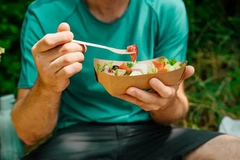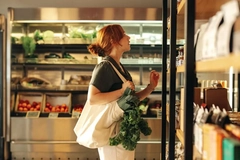Ready meals unraveled: ProAmpac boosts convenience, e-commerce and circularity with PCR pouches

23 May 2022 --- Consumer convenience, e-commerce distribution and environmental sustainability are dominating ready meal packaging design, according to Nathan Klettlinger, director for global marketing at ProAmpac.
Speaking to PackagingInsights, Klettlinger makes the argument that plastic pouches are the ideal solution for increased convenience, e-commerce and a carbon-efficient circular economy for ready meals.
According to Innova Market Insights, plastic is used as the primary packaging material for 2 in 3 new ready meal products globally. However, standard trays remain the most popular packaging format with a 39% market share.
Convenience is king
In terms of convenience, heat-and-eat meals or meal supplements like soups, pasta, potatoes, vegetables or other quick options require packaging as convenient as the meal option itself, explains Klettlinger.

“Moving these products from cans or film trays inside boxes to microwavable pouches allows consumers to skip the can-opener, bowl, and dishwashing to eat directly from the pouch, thereby reducing preparation, clean-up and use of a secondary opening device. Additionally, microwavable pouches can be manipulated easily to get all the product out of the package to eliminate food waste.”Nathan Klettlinger, ProAmpac’s director for global marketing.
ProAmpac offers various fitments, closures, storage or use conditions, and shelf differentiation techniques to boost ready meal pouch convenience, including several reclose options to aid in portion control or fitments for directional pouring with a closure.
“Our spouted pouches are among the most popular designs for ready meals like soups because the shape is reminiscent of traditional boxed options but gives an easier pouring and storing experience. As flexible pouches, consumers can store them more easily in their pantry without taking up additional space,” says Klettlinger.
“Additionally, the spouts allow for a clean directional pour without additional utensils to minimize dishes to be washed. For single-use ready meals, ProAmpac offers laser scoring for easy opening. The laser scoring allows consumers to cleanly tear the top of the pouch from the package to either dispense to the plate or eat directly from the pouch.”
Supporting e-commerce expansion
The past two years have accelerated an already growing e-commerce market. Home delivery for food is expanding among traditional grocery retailers along with the expansion of virtual food stores. This trend puts a focus on packaging that can withstand the rigors of shipping and handling, explains Klettlinger.
“Flexible packaging is a great solution for brands as pouches provide the product protection needed to meet shelf life requirements but are also lighter weight and less breakable than rigid containers.”
“Also, many brands and retailers are focusing on making their packaging more environmentally sustainable. Packaging reduction typically has one of the highest impacts on a product’s carbon footprint because of weight and space savings. Moving from rigid packaging to flexible can enable brands to claim packaging reduction, virgin plastic reduction and often a carbon footprint reduction.” ProAmpac can incorporate PCR into its ready meal pouches for compliancy with new legislation.
ProAmpac can incorporate PCR into its ready meal pouches for compliancy with new legislation.
Circular economy solutions
Moreover, flexible packaging can be made recyclable and with post-consumer recycled (PCR) content or plant-based renewable materials. For example, ProAmpac can incorporate PCR content into its ProActive PCR Retort Pouches.
“Incorporating PCR into flexible packaging is often a good choice for highly demanding pouch applications like retort processing because the barrier properties and filling performance of these pouches are maintained,” explains Klettlinger.
“For applications like microwave-in-bag vegetables, recyclable mono-PE films are available, which include ProActive Recyclable R-2000S steamable films.”
Legislation in Europe and North America are simultaneously encouraging circular packaging innovation with the introduction of the UK Plastic Packaging Tax, the EU’s non-recycled plastics tax, and California’s ban on single-use plastic bags and microplastics in wash-off products.
Extended producer responsibility (EPR) is also growing in the US and already established in Europe and Canada. EPR typically is linked with eco-modulation, allowing lower fees for more environmentally sustainable packaging.
ProAmpac’s PCR innovation
The demand for recyclable or other environmentally sustainable packaging continues to grow to ensure compliance with new legislation, notes Klettlinger. The supplier’s ProActive Sustainability suite of products works to meet both consumer and regulatory brands by matching brand owners with the packaging solution that best suits their product needs.
“Many ready meals use sauce or other high residue components that may render them ineligible for recycling in some recycling streams. For these options, ProAmpac has launched its ProActive PCR Retort pouch that incorporates more recycled plastics into the overall structure to be compliant with the tax in the UK.”
“Incorporating PCR materials into the overall packaging helps brand owners to meet their environmental sustainability goals and be compliant with legislation without sacrificing packaging requirements or existing product composition.”
ProActive PCR Retort pouches offer 30% or greater PCR content, reducing the use of virgin resins in the packaging. These novel pouches have the same high-definition graphic quality as the standard retort pouches, while both graphics and package performance work to preserve brand identity and product freshness.
ProAmpac also offers its ProActive Recycle Ready RT-3000 Retort pouches for high residue products. A foil-free solution for both pet and human food, RT-3000 pouches are available in stand-up and three-side seal configurations and are EU- and FDA-compliant for food contact in retort applications.
 ProAmpac’s recycle-ready pouches run at similar filing speeds to unrecyclable multimaterial structures.“A recycle-ready monomaterial, RT-3000 maintains its higher barrier properties at retort temperatures up to 130 OC even after the retort process. As with other ProAmpac solutions, RT-3000 is designed to run at similar filing and processing speeds as current multimaterial structures that aren’t recyclable. This mono-material solution is intended for advanced chemical recycling streams,” continues Klettlinger.
ProAmpac’s recycle-ready pouches run at similar filing speeds to unrecyclable multimaterial structures.“A recycle-ready monomaterial, RT-3000 maintains its higher barrier properties at retort temperatures up to 130 OC even after the retort process. As with other ProAmpac solutions, RT-3000 is designed to run at similar filing and processing speeds as current multimaterial structures that aren’t recyclable. This mono-material solution is intended for advanced chemical recycling streams,” continues Klettlinger.
“For ready meals that do not contain high residue products, like non-fat vegetables, our ProActive Recyclable R-2000S is a pioneering PE-based film that fulfills the market need for recyclable packaging which withstands the demands of a microwave heating environment. ProActive Recyclable R-2000S is a patent-pending polyethylene-based film designed to run on high-speed form/fill/seal equipment and is pre-qualified for store drop-off recycling,” he adds.
Additionally, ProActive Recyclable R-2000S provides optimal ink protection and ideal stiffness for enhanced freezer case presence in both gusseted and non-gusseted formats.
Advanced recycling
Many ready meal options leave food residue in their packaging, requiring consumers to wash rigid containers before curbside recycling. In addition, flexible packaging for retort applications must be able to withstand aggressive processing conditions without sacrificing barrier or other performance attributes.
These conditions typically require multimaterial laminates, which make the package problematic to recycle. According to Klettlinger, advanced recycling will be a critical part of the world’s future recycling infrastructure as brands transition to packaging that supports the circular economy.
“Utilizing monomaterial flexible packaging structures is a great way that brands can plan for the future of recyclability. Monomaterial packages are more economically viable than mixed material structures in advanced recycling systems because they allow for higher recovery and better economic viability,” he says.
“This is why ProAmpac’s Recycle Ready Retort pouch is so novel. It has been tested by two independent advanced recycling firms, and they confirmed RT-3000 pouches met the yield requirements as well as the quality parameters for further recycling.” Although pouches are increasingly popular, standard trays remain the most common packaging format for ready meals.
Although pouches are increasingly popular, standard trays remain the most common packaging format for ready meals.
However, a big issue with recycling streams is that they are generally focused on rigid products, not flexibles. Klettlinger says more investment is needed to enable the processing of flexible packaging.
“Advanced recycling will be a critical part of the world’s future recycling infrastructure as brands transition to packaging that supports the circular economy. Governments can support advanced recycling in addition to mechanical recycling. In either process, monomaterial structures are part of the circular solution,” he concludes.
Finishing touches
ProAmpac offers a variety of conventional and environmentally sustainable film options that are designed to withstand cold chain conditions, like its frozen food rollstock options that come with either Inno-Lok, Pour&Lok, or laser-scored opening features.
Additionally, ProAmpac offers sensory packaging – Signature Surfaces – to help set brands apart on the shelf with four unique finishes: Paper Touch, Soft Touch Matte, Registered Matte, and Chromic. Signature Surfaces Chromic gives brand owners the opportunity to “reveal” thermochromic messaging at any specified temperature.
By Joshua Poole












